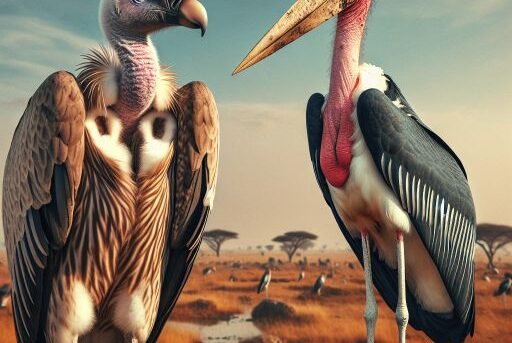Location and Habitat
The vulture, a bird often associated with arid and semi-arid regions, is found across various continents including Europe, Asia, and Africa. These birds are predominantly scavengers, playing a crucial role in their ecosystems by consuming carrion, which helps prevent the spread of diseases. Vultures prefer open landscapes such as savannahs, grasslands, and deserts where they can easily spot their food sources from great heights.
On the other hand, the marabou stork, with its distinctive bald head and large bill, inhabits the warmer parts of sub-Saharan Africa. These large birds are often found in both wet and dry habitats, ranging from savannahs and grasslands to the edges of forests and wetlands. Like vultures, marabou storks are primarily scavengers, but they are also known to fish and hunt for small animals, making them versatile in their feeding habits. Their presence near human habitation is also notable, as they are commonly seen scavenging in landfills and slaughterhouses.
Vulture vs. Marabou Stork Comparison
| Animal | Size and Weight | Ability to Finish Opponent | Weaponry |
|---|---|---|---|
| Vulture | Varies by species; typically 0.85 to 2.2 meters in wingspan, 0.8 to 10 kg in weight | Low; primarily scavengers, not adapted for killing large prey | Strong beak for tearing carrion |
| Marabou Stork | Up to 1.52 meters in height, 2.6 meters wingspan, 4.5 to 9 kg in weight | Medium; can be aggressive, occasionally hunts small animals or fish | Large, sharp bill and size advantage |
“`
Hunting and Skills
Vultures primarily feed on carrion, which consists of dead animals, relying on their keen sense of sight and smell to locate their meals. They rarely hunt live prey, but when they do, it’s typically weak or dying animals. In contrast, the Marabou Stork, while also often scavenging alongside vultures, will prey on a broader range of food sources including fish, frogs, snakes, birds, and insects. Marabou Storks are opportunistic feeders and can hunt for live prey by using their large bills to snatch or stab their food. They are also known to visit garbage dumps and slaughterhouses to feed. Both birds play crucial roles in their ecosystems by helping to clean up carrion and waste.
Vulture vs. Marabou Stork Who Would Win?
The vulture and marabou stork face off, using their large wingspans to intimidate each other. The vulture, more aggressive, swoops first, attempting to use its sharp beak as a weapon. The marabou stork, with its slightly longer reach and larger size, counters by jabbing at the vulture. The fight primarily involves aerial maneuvers and pecking, with neither bird equipped to deliver a fatal blow quickly. The marabou stork’s endurance and size give it a slight advantage, allowing it to outlast the vulture in this skirmish. After a prolonged bout, the vulture retreats due to exhaustion.
Winner: Marabou Stork with a 60% chance of winning.




